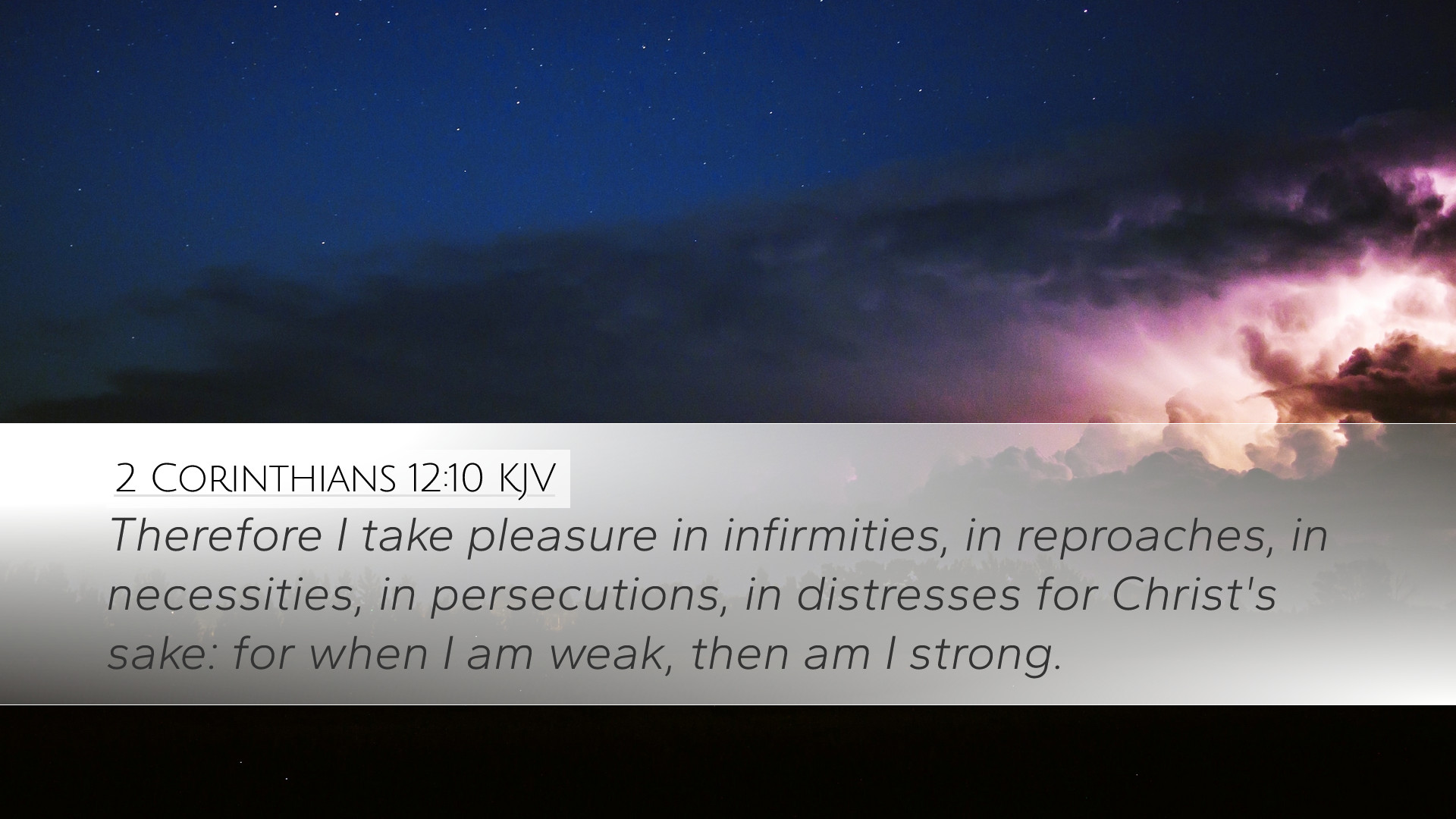Commentary on 2 Corinthians 12:10
"Therefore I take pleasure in infirmities, in reproaches, in necessities, in persecutions, in distresses for Christ's sake: for when I am weak, then am I strong."
Introduction
This passage reflects the Apostle Paul's profound understanding of strength and weakness in the Christian life. In this verse, Paul articulates a paradox of faith: true strength is found in weakness. This commentary draws upon the insights of prominent public domain theologians including Matthew Henry, Albert Barnes, and Adam Clarke.
Exegesis of the Verse
The context of this verse is critical. It follows Paul's defense of his apostolic authority against false apostles and the criticism he faced. Paul’s mention of weaknesses serves as a counter to those who boast in strength and prestige.
Understanding "Weakness"
Paul lists various forms of "weakness" that he embraces:
- Infirmities: This term encompasses physical ailments and trials that hinder one's ability to function. Paul acknowledges that these weaknesses can be used by God to shape and refine believers.
- Reproaches: He speaks of insults and slanders faced for the sake of the Gospel. Paul willingly endures these affronts because they align him with Christ's sufferings.
- Necessities: This refers to both physical needs and spiritual lack. Paul understood that dependence on God in need leads to a deeper faith.
- Persecutions: As a servant of Christ, Paul faced unbearable opposition. His willingness to suffer for Christ's name exemplifies his commitment to the Gospel.
- Distresses: These are various pressures and afflictions that come in the course of life, particularly in ministry.
Paul's declaration, "for when I am weak, then am I strong," emphasizes the transformative nature of divine strength in human frailty. Here, he reflects a theology of the cross, where apparent defeat leads to ultimate victory through Christ.
Theological Insights
This verse provides a rich theological ground for understanding suffering and divine strength. Matthew Henry captures the essence of Paul's perspective on trials and tribulations:
"We must bear and forbear; we may be in some respects in our charge, but it becomes us not to complain of infirmities; they are the tools for God's glory."
Henry emphasizes that trials are not merely obstacles but opportunities for demonstrating God's grace. Similarly, Albert Barnes adds that Paul’s ability to find pleasure in weakness stems from his deep reliance on Christ:
"The strength of the believer is in the Lord, and when we are most in need, we find Him to be our support."
Practical Implications for Believers
This verse should encourage believers to shift their perspective on weakness and suffering. Here are some practical implications:
- Redefining Strength: The world's view of strength often emphasizes self-sufficiency and dominance. However, Paul invites us to find strength in vulnerability and reliance upon God.
- Embracing Suffering: By viewing hardships through the lens of faith, believers can transform their trials into testimonies of God's faithfulness.
- Community and Solidarity: Acknowledging weaknesses fosters authentic community where believers support one another, reflecting the body of Christ.
- Spiritual Growth: Trials produce resilience and deepen the believer’s relationship with Christ, making them more effective witnesses for the Kingdom.
Conclusion
In 2 Corinthians 12:10, Paul provides profound wisdom that reverberates throughout Christian life and ministry. His insights serve as a reminder to embrace our weaknesses, recognizing that they are the pathway to experiencing the divine strength of God. As we reflect on this teaching, may we learn to find joy and purpose in our struggles, knowing that in our weakness, God's strength is perfected.


